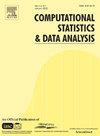FDR控制下无限维数据的分位数特征筛选
IF 1.6
3区 数学
Q3 COMPUTER SCIENCE, INTERDISCIPLINARY APPLICATIONS
引用次数: 0
摘要
本研究的重点是通过给定特征的响应的条件空间分位数(CSQ)来检测特征对无限维响应的影响,并开发了一种新的CSQ回归函数的无模型特征筛选程序。首先,提出了一种新的基于核的条件分位数依赖度量(KCQD)来度量CSQ对特征的依赖程度。当且仅当特征独立于响应的CSQ时,度量等于0,因此用于检测特征的贡献。然后,通过分布式策略开发了具有估计KCQD分数的两步特征筛选程序。理论分析表明,新的两步筛选方法不仅具有筛选一致性和确定的筛选性能,而且实现了对错误发现率的控制。仿真研究表明,该方法能够在保持高筛选功率的同时控制预期的FDR水平。所提出的程序被应用于分析脑磁图数据集,并且识别的信号位置在解剖学上是可解释的。本文章由计算机程序翻译,如有差异,请以英文原文为准。
Quantile feature screening for infinite dimensional data under FDR control
This study is focused on the detection of effects of features on an infinite dimensional response through the conditional spatial quantiles (CSQ) of the response given the features, and develops a novel model-free feature screening procedure for the CSQ regression function. Firstly, a new metric named kernel-based conditional quantile dependence (KCQD) is proposed to measure the dependence of the CSQ on a feature. The metric equals 0 if and only if the feature is independent of the CSQ of the response, and thus is employed to detect the contribution of a feature. Then a two-step feature screening procedure with the estimated KCQD scores is developed via a distributed strategy. Theoretical analyses reveal that the new two-step screening method not only has screening consistency and sure screening properties but also achieves control over false discovery rate (FDR). Simulation studies show its ability to control the expected FDR level while maintaining high screening power. The proposed procedure is applied to analyze a magnetoencephalography dataset, and the identified signal positions are anatomically interpretable.
求助全文
通过发布文献求助,成功后即可免费获取论文全文。
去求助
来源期刊

Computational Statistics & Data Analysis
数学-计算机:跨学科应用
CiteScore
3.70
自引率
5.60%
发文量
167
审稿时长
60 days
期刊介绍:
Computational Statistics and Data Analysis (CSDA), an Official Publication of the network Computational and Methodological Statistics (CMStatistics) and of the International Association for Statistical Computing (IASC), is an international journal dedicated to the dissemination of methodological research and applications in the areas of computational statistics and data analysis. The journal consists of four refereed sections which are divided into the following subject areas:
I) Computational Statistics - Manuscripts dealing with: 1) the explicit impact of computers on statistical methodology (e.g., Bayesian computing, bioinformatics,computer graphics, computer intensive inferential methods, data exploration, data mining, expert systems, heuristics, knowledge based systems, machine learning, neural networks, numerical and optimization methods, parallel computing, statistical databases, statistical systems), and 2) the development, evaluation and validation of statistical software and algorithms. Software and algorithms can be submitted with manuscripts and will be stored together with the online article.
II) Statistical Methodology for Data Analysis - Manuscripts dealing with novel and original data analytical strategies and methodologies applied in biostatistics (design and analytic methods for clinical trials, epidemiological studies, statistical genetics, or genetic/environmental interactions), chemometrics, classification, data exploration, density estimation, design of experiments, environmetrics, education, image analysis, marketing, model free data exploration, pattern recognition, psychometrics, statistical physics, image processing, robust procedures.
[...]
III) Special Applications - [...]
IV) Annals of Statistical Data Science [...]
 求助内容:
求助内容: 应助结果提醒方式:
应助结果提醒方式:


